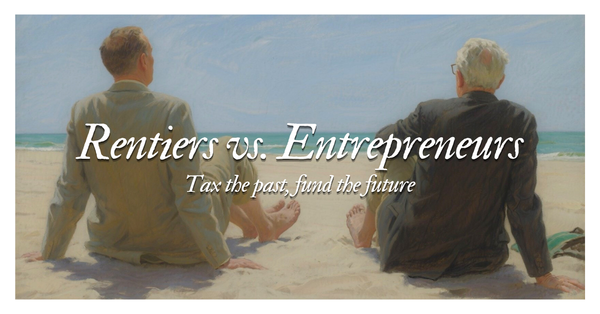Social Spending and Entrepreneurship: Pôle Emploi, France's n°1 pre-seed fund?

This quote by former French Prime Minister Raymond Barre in 1980 could very well have been said today by any random person criticising the allocation of unemployment benefits.
I came across a Linkedin post this morning that was challenging the impact of governmental support in fostering entrepreneurship. The post was a bit 'clickbaity' in questioning whether social spending was a drain on entrepreneurship and referenced a study without sourcing it: just another day on LinkedIn you may say. Given the topic was an interesting one, I went on to look for the study and read the paper.
I've written more than I anticipated (yeah I know..) so I'll split it into 2 posts:
- What is the relationship between entrepreneurs and social spending in France? - which is what you're reading
- Discussions on the main points articulated in the paper
Pôle Emploi as a pre-seed fund
Back in 2016, Christophe Bys, a french journalist coined the term "URSSAF Ventures" to describe the French Public Unemployment service. Why? Because for many years, the French government has been subsidising entrepreneurship indirectly. Job seekers could be eligible for unemployment benefits for a period of up to 2 years, which since February 2023 has been readjusted to 1.5 years. In 2021, the average job seeker/entrepeneur had roughly 61% of their gross salary (called replacement rates or "taux de remplacement moyen") covered by the unemployment allowance.


This may seem high but relative to similar countries is very much 'middle of the pack'. The big variable in my opinion has been the duration of indemnification where France has historically been much more generous. Net replacement rates also need to be seen in the context of duration of protection. Which is where I believe France's secret sauce has historically been.
I went to do some digging in the OECD database and found the following:

France ranks 4th in the 2022 OECD stats in terms of highest % of salary maintained after 1.5 years of unemployment. With the reform decreasing the eligible time of benefits from 24 months to 18 months, I suspect France will drop lower in this ranking but the difference with some other leading economies is quite striking. Interestingly, according to Pitchbook data, Boldstart identified that the median age of companies funded at Pre-Seed is now 1.2 years old... It doesn't get us too far off from the 1.5 years of indemnification offered in France?
Undeniably, more French entrepreneurs have been able to start their businesses thanks to this additional safety net. Data is hard to come across but in 2014, 13% of the 550k companies founded in France were created by the unemployed. According to a more recent 2019 study, 15% of jobseekers who went through a rupture conventionnelle (we'll define this soon) went on to start their business.

I wouldn't be surprised if this number had grown over the past 10 years. French entrepreneurs have since benefited from more favorable regimes. Since 2019, wannabe entrepreneurs who have worked for 5 years continuously can resign AND be eligible for unemployment benefits with the Demission/Reconversion program. Should a former employee want to start their business, they are entitled to the "traditional" unemployment benefits or can, instead, ask for the lump sum of 60% of the eligible benefits they would have perceived. This flexibility enables certain entrepreneurs to funnel this capital straight into their business to maximise its chances of success. Such programs are a strong driver in lowering risk aversion and the downside to starting a business.
The Rupture Conventionnelle (RC) 👸
As explained by Florent Vairet in this great article (in French) on the topic, the rupture conventionnelle, a mutually agreed termination if you will, has been on a steady rise over the past years. Why? Most importantly because it is what makes employees eligible for full employment benefits. You just need to look at this chart of the number of RCs to see the growing interest from both companies and employees:

The main entity impacted by this is the state. Substituting a rupture conventionelle for a layoff wouldn't result in any additional cost for the Public Employment service, so should we care at all? Looking at the graph below, 10 years after the introduction of this scheme, it already represents more than 20% of the total budget of unemployment indemnifications. If this additional investment comes with the benefit of more entrepreneurs then this cost may be a welcome one. The question this graph also begs is whether economic redundancies (licenciements économiques) are being disguised as ruptures conventionelles which would be a topic for another post.

The bigger picture
Beyond unemployment benefits, I often hear people talking about how entrepreneurship in Europe is under perfusion from government money and how it's a reflection of a dead ecosystem. If I work in venture capital today in France it's obviously because I disagree with the conclusion. I think that the European continent is looking to support its emerging technological players and is directly investing to support them. and that given that it's traditional industry hasn't been exposed as early to the venture capital asset class as the United States has been. It takes time for ecosystems to be built.
- Is the liquidity and exit market where it should be? Not yet.
- Is the pool of capital as developed in the venture capital asset class as it is in the United States? It's growing.
- Is the venture ecosystem in Europe the most mature it's ever been? Yes.
- Is the talent flywheel flying faster than ever here? Certainly so.
National entities and the EU can create as fertile a ground as possible on the liquidity side and can intervene/support on the investment front through direct and indirect means. Some may question how well this is being done but at least it's happening and we have the proof in France that work done by the BPI and the French Tech are starting to yield positive results. The "décôte d'illiquidité" announced recently by Jean-Noël Barrot is yet another step in the right direction.

This is all for today, stay tuned for part-2 where we'll be discussing the paper. As always, I've tried to source and redirect to the different articles and reports but if you've spotted any inaccuracies do let me know! Thanks to Arnauld Bessagnet for having spurred those thoughts with his post.




